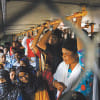Surely we deserve safe public transport

It is quite telling that, in 2024, a non-government organisation has to demand that the government scrap unfit, rundown buses in the capital city. The Bangladesh Jatri Kalyan Samity has also proposed introducing 5,000 good quality buses under the government's management to resolve Dhaka's traffic chaos. We cannot help but be frustrated that such a basic requirement—having a decent public transport system and getting rid of dilapidated buses—needs to be demanded. That, too, when thousands of crores of taka have been spent on Dhaka's metro rail, expressway and flyovers, all of which have been welcome developments but have not solved the daily traffic congestion on the ground. When it is evident that ordinary citizens continue to rely on the public transport system, why must they have to board rickety, unfit buses?
We welcome the organisation's suggestion to bring the new buses under government management as we have seen how syndicates of private bus companies hold the public transport system hostage by holding strikes whenever there is an attempt to bring discipline to the system. What's more, the government has indulged these syndicates. For instance, why would it go back on its decision to put a cap on the economic life of buses at 20 years and trucks at 25 years?
Thus, despite prior promises to take them off the streets, we now see decrepit buses with their paint peeling off, sometimes missing a headlight and with shoddy seats, plying through the streets. Not only do they contribute to air pollution with their noxious, black smoke, they are also dangerous and can cause fatal accidents. We agree with the suggestion to have a new bus company under the government's management or through public-private partnership (PPP). According to the samity, the Tk 3 lakh crore invested in metro rail and elevated expressway will cater to only 35 percent commuters, while the introduction of 5,000 new buses at a cost of around Tk 3,000 crore will be able to transport 65 percent passengers. From an economical and public interest perspective, it seems prudent to have fit, comfortable buses on the roads that are controlled and managed by the government in full or in collaboration with the private sector.
Commuters in Dhaka want a modern, safe and affordable public transport system that will significantly reduce the constant traffic gridlocks, which cause enormous loss of productive hours, not to mention take a heavy toll on public health. Introducing an accountable public transport system must be prioritised by this government. In addition, enforcing traffic laws, which include punishing rash driving, illegal parking and eliminating corruption, must go hand in hand to bring discipline and efficiency in the public transport system.


 For all latest news, follow The Daily Star's Google News channel.
For all latest news, follow The Daily Star's Google News channel. 









Comments